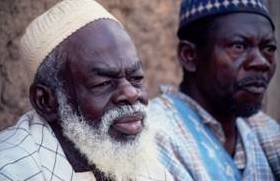 These are titles used for Muslims
who have made the pilgrimage to Mecca. In Gambia some men are
actually named Alhajie even though they may never have left the
country and the same applies to women called Ajaratou.
These are titles used for Muslims
who have made the pilgrimage to Mecca. In Gambia some men are
actually named Alhajie even though they may never have left the
country and the same applies to women called Ajaratou.
A "haji" is an honorific title given to a Gambian Muslim
person who has successfully completed the Hajj
to Mecca. "Al-" is Arabic for "the". So,
"Al-Hajji" is simply a title applied to a haji. Performing
these rituals, known as the Haj, is the fifth pillar of Islam
and the most significant manifestation of Islamic faith and unity.
Undertaking the Haj at least once is a duty for Muslims who are
physically and financially able to make the journey to Mecca.
The emphasis on financial ability is meant to ensure that a Muslim
takes care of his family first.
The requirement that a Muslim be healthy and physically capable
of undertaking the pilgrimage is intended to exempt those who
cannot endure the rigors of extended travel.
It is a journey toward Almighty Allah, where Muslims leave behind
everything related to worldly life, which was their companion
since birth. Muslims then change the habits that they have become
accustomed to, such as cutting hair, spraying on perfume, clipping
nails, etc.
The terms usually refers to an older person as it can often take
time for one to accumulate sufficient funds to finance their travels.
Pilgrims also leave behind their families and wealth and go out
to Allah oblivious to all these and focusing only on the one single
aim of returning to Allah. This is done with appropriate dhikr
(Arabic for: remembrance of Allah), du`aa' (Arabic for: supplication),
and qunout (Arabic for: heartfelt pleading to Allah). All of these
have an effect on improving the spiritual aspects.
In addition to this, hajj is the season when Muslims meet with
their fellow Muslims to celebrate the sense of belonging to one
nation.
|
|

|
|



